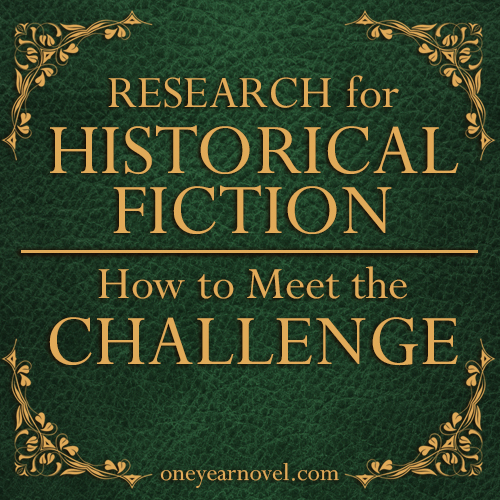Research for Historical Fiction – How to Meet the Challenge
 You may like to read part one, “A Secret to Historical Fiction that Won’t Make Historians Cry,” first.
You may like to read part one, “A Secret to Historical Fiction that Won’t Make Historians Cry,” first.
By Rachel Garner, Staff Writer
So, last week I talked about the way historians think and how thinking like they do can help your historical fiction. This week I want to address what I called Plea for Help One:
I’m writing historical fiction. How do I research??
This is the question I find hardest to answer. It would be easy for me to recommend specific sources from my field of study that would be helpful if you happen to write in the same time period I do. But alas. Instead, I’m going to give you some general guidelines to follow when researching your period. Here’s where (and where not) to start.
THE INTERNET
Do not, I beg of you, start by Googling “daily life in [time period].” You will pull up lots of sites, and they very well could be right about some things, but chances are that they are not accurate and are, at the very least, highly generalized. Remember last week’s post? We need specifics. We don’t want a website that’s trying to be the non-existent historian who specializes in all of Europe from 500 to 1500 AD. Especially since this kind of “historian” rarely cites sources.
But, it is worth noting that true information was (ironically) part of the plan with the creation of the Internet; and there are some ways in which the Internet is useful.
Wikipedia
When I started college four years ago, Wikipedia was in the absolutely not, no, never category. But the truth is—and some professors have begun to admit this—that while Wikipedia isn’t a source you should cite, it can frequently be a good place to begin groundwork. I like to use it to remind myself of broad political and religious situations—who was the king of where and what were they doing, more or less. As I mentioned last week, my stories are about “small” people so it’s not necessary for me to have fussy specifics about King John, for example. If I DO want them, I would definitely move to books.
You can also click on the tab at the top of the page to move to the “talk” section of the article. You’ll be able to see the “rating” of the article and any arguments between editors, which will give you a more thorough idea of how trustworthy the article is considered to be. As it turns out, the article on King John was a featured article—top of the Wikipedia class.
I also recommend scrolling to the bottom to see the author’s sources. Some of these sources will be better than others, but it may give you an idea of where to go next (several of the sources for the King John article are actually things I’ve had to read in college!).
University library databases
I’m going to mention this again later, but you might try looking up academic databases, especially those linked by universities, such as JSTOR. The problem here is that you may hit either a paywall or a request to sign in via a university ID.
Museum websites and databases
This is a different angle, but if you want to get an idea of material culture (what people left behind), which you probably should, some museums are uploading digital versions of their collections. One example is the British Museum, a massive museum in London. The Metropolitan Museum of Art, in New York, and the Smithsonian also have online records and pictures (these latter two I discovered by Googling “museums with online collections,” demonstrating that there is a productive way to use Google searches. Unsurprisingly, it requires being specific).
The amount of available information in these digital archives varies, but you can at least be certain that whatever information they have is informed—because unlike your average Internet user, museum people are professionals and care about that kind of thing.
Museum objects vary from the mundane (piles and piles of Roman coins—but your characters will likely use coins!) to the stunning (Anglo-Saxon metalwork is something else).
BOOKS
My personal favorite. You can always trust books, right?
Well, not exactly.
In the history discipline, newer research tends to be preferred. There are downsides to this, but usually a book released in 2007 will have more up-to-date and accurate information than one released in 1942. I know this is especially true of medieval history, which has gone through several waves in kinds of scholarship.
There’s a whole list of historiographical (the history of history) reasons for this that we don’t have time for—but be aware of it in your book hunting. The Victorian historians especially wreaked havoc on our understanding of the Middle Ages. It is worth noting that today’s biases may be doing some disservice to the history as well, but it’s going to be hard to know what’s nonsense and what’s legitimate until about fifty years from now!
In addition, there’s a difference between writing “popular history” and “academic history.” Popular history aims at a general public and can be very engaging to read but it can be written by less well-versed historians or even very good historians who are nonetheless stretching beyond what they know best to make things coherent (someone who specializes in the 11th century may be covering the 9th through the 13th , for example). Most of the time good popular history (well-sourced and newer) is going to do the job just fine for someone writing historical fiction. A perk of popular fiction is that it is likely to focus on “real life” of “normal people” which is probably what you’re most interested in. My main suggestion would to be look up reviews on a book and see what the snooty people (my brethren) are saying about its accuracy.
Public libraries
With those caveats out of the way, where do you start? I actually agree with a common recommendation: head to the children’s section of a public library. It can give you an overview and generally focuses on the things most interesting to creative writers. The main problem is again going to be generalized information—kid’s books tend to be about “the Middle Ages” not “11th century France.”
University libraries
Once you’re ready to go deeper, if there is a public university anywhere near you, I highly recommend visiting. Most public universities are perfectly okay with visitors. You probably will not be able to check out books, but you can look at them. And depending on where you live, there may be a way to pay for a library card.
Also, while on campus you may be able to get access to online journal collections like JSTOR. You may also be able to use inter-library loan systems at your public library to get university library books (I did this as a high schooler).
The great thing about academic library history books is that they can be written about really specific things. You can read whole books on what people ate in the Anglo-Saxon period. Historians are weird like that.
One very important thing to note is that there’s probably not going to be a single “section” of the library where all relevant information to your interest is located. You’re going to want to use the online search system and write down call numbers. Yes, there will be a section that’s just “medieval England,” but it’s going to be mostly political things. You’ll have to go to other parts of the library to find things on clothes or food or law.
Bibliographies and indexes
If you find a great book full of the kind of information you want, check the bibliography. Bibliographies, footnotes, and indexes are how historians talk to teach other. They can be goldmines of information. Sometimes even children’s books have these.
Similarly, indexes in gigantic, scholarly works will help you get to the specific points you need. Even as a history major, I don’t always read books in their entirety; I focus on the most relevant and helpful chapters. If you pick up a gigantic book that covers your period (cough England Under the Norman and Angevin Kings cough) and really just want to know something specific, check the table of contents first and the index second.
Other historical fiction
I leave this for last because I’m hesitant to include it. It is possible to take cues from other historical fiction written in your time period. In many ways, that’s how I started off—I’d read a bunch of Robin Hood novels, so I figured I had a decent grasp and jumped in. But you should never consider an aspect of any kind of history fact if the only place you can find it is in another fiction book. If it’s extremely relevant to your own story, do your own research.
PEOPLE
At the end of these two blog posts, you may be thinking: Good heavens I am never asking her anything, she will judge me so hard. Please don’t! If you happen to know a historian who specializes in the period you want to write in, or at least somewhere close, please ask them. If you’re doing what I suggested in the first post—dumping your clichés and being specific—it’s very unlikely that they’re going to shut you down. They may be delighted. Historians love history, which usually means they like talking about it. Go figure.
The main thing we historians can offer is a narrowed search.
A lot of the time what historians know is not the exact facts—but exactly where to find them.
BONUS TIP
Take notes! Even if you don’t end up using everything you learn in your novels, you’re probably still going to be hitting yourself in the head if you think you remember a fact but can’t remember where it was from or how reputable the source was. Get a notebook and keep track—future you will thank you for it.
—
Now that you’re armed with an arsenal of advice and the weight of dozens of historians’ opinions, I can imagine your next response, if it hasn’t occurred to you already: But I write fiction. How does my artistic dream interact with history? How do I respect my story and also respect history?
That’s where we’re going next.
…
Rachel was one of the seven students—or self-labeled “guinea pigs”—who took part in the pilot class for The One Year Adventure Novel. Known as “Nairam” in the extended OYAN community, Rachel is an example of dedication to her craft and a gifted editor. She is also a kind and forthright writing mentor to students at every level of the program, and a Story Coach. A homeschool graduate, she is now in college studying history. When not hiding out in the medieval England section of her school library, she edits her Robin Hood retelling and pretends that ten years is definitely not too long to spend on a single writing project.




I’m enjoying this series so much and look forward to what you’ve got next! As a great lover of history but (generally) hater of research, I can sometimes feel a bit overwhelmed when it comes to writing my own historical fiction. This post helps me break down some of that “Aah” into more specific research options. Thanks, Nairam!
You’re welcome! I’m glad it is of help.
Rachel, thank you for this excellent article. I’m also a fan of history research, and have surfed the resources you mention. I would only add Google Books, which I’ve found helpful for amazing historical primary source quotations/translations. But maybe this is a bit challenging for the younger kids doing OYAN.
Two of my kids are doing OYAN this year and I’ll direct them to your articles as well.
As a family, whenever we do OYAN or NaNoWriMo we always choose an historical time period to all work on. This year, the setting has to be ancient times (anywhere from Neolithic to late Roman–going along with our Bones in My Backyard Youtube channel). So far we have some interesting prep going on–we’re on Chapter 15.
I’ve linked this page on my webpage about doing history research, because historical fiction is one way I recommend for application of history research. http://bit.ly/DNB10elem Well explained! I hope you get some traffic from my site. Again, thanks and well done.
Hello Darlene!
I’ve occasionally ventured into Google Books, but I will confess that I’ve found it very confusing. Maybe once I’m done with college (and have fewer of the resources I’m used to) I should decide to figure it out.
It’s really cool that you combine writing with learning history! I actually realized how much I loved history (even though I had liked it since I was a kid) when I started writing and researching a historical novel in high school (probably unsurprisingly, it was set in the Middle Ages). It helped change my whole college trajectory.
Thanks for the link!